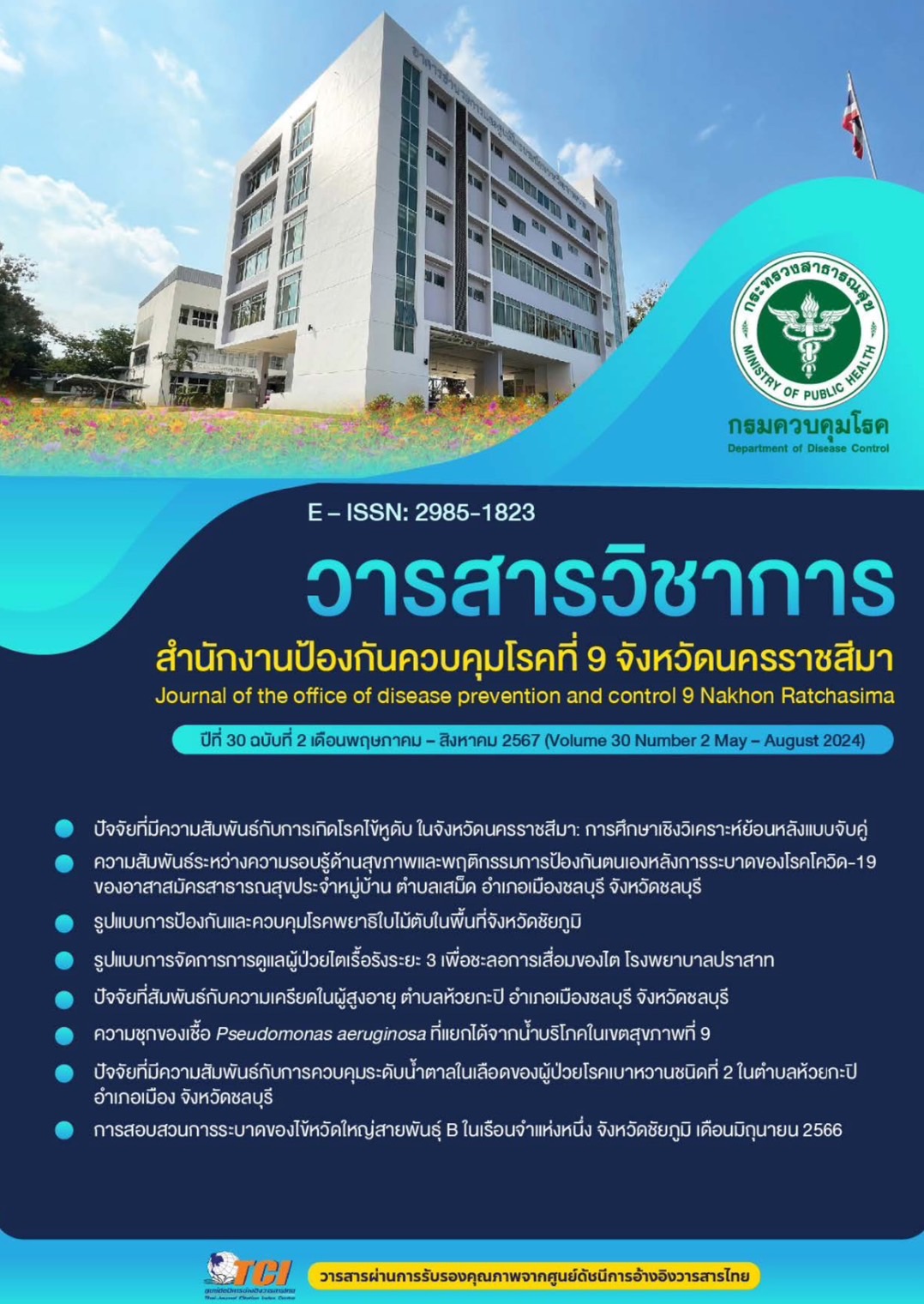Factors Associated with the Incidence of Streptococcus suis Infection in Nakhon Ratchasima Province: Matched Case-Control Study
Keywords:
Streptococcus suis infection, Consuming raw pork behavior, Exposure behavior, Belief, AttitudeAbstract
Streptococcus suis infection, an emerging zoonosis, has raised concerns regarding the contribution of behavioral and exposure risk factors such as consuming raw pork and contacting pigs that might be infected with S. suis. Currently, there has been an increase in S. suis infection cases in Nakhon Ratchasima province. The objective of the study was to explore the factors associated with S. suis infection in Nakhon Ratchasima province. An analytical study, specifically a 1:3 matched case-control study, was conducted. All 276 individual samples residing in Nakhon Ratchasima province were divided into two groups: the case group and the control group. The case group comprised 69 individuals who had reported cases of S. suis infection to the National Disease Surveillance (report 506), while the control group included 207 individuals who had not contracted S. suis infection. Data collection was conducted in March–April 2023 through interviews, and the data were analyzed using multiple conditional logistic regression equations. The results showed that factors associated with S. suis infection were individuals with underlying diseases (ORadj 4.63; 95% CI: 1.93-11.07), individuals who had consumed raw pork (ORadj 13.33; 95% CI: 5.42-32.77), individuals who had wounds on their hands while exposed to pigs (ORadj 6.61; 95% CI: 1.89-23.07), and individuals who had beliefs and attitudes at a low level regarding the S. suis infection (ORadj 3.55; 95% CI: 1.51-8.38). Therefore, there should be guidelines to improve knowledge, beliefs, and attitudes regarding S. suis infection. It could be potentially useful to prevent and reduce the number of patients, especially elderly people, people with underlying health conditions, and people who engage in risky behaviors.
References
Lun ZR, Wang QP, Chen XG, Li AX, Zhu XQ. Streptococcus suis: an emerging zoonotic pathogen. Lancet Infect Dis. 2007;7(3):201-9.
ยุพิน ศุพุทธมงคล, ปฐมาพร เอมะวิศิษฎ์, อนุพงค์ สุจริยากุล, รัตนา ธีระวัฒน์, บรรณาธิการ. แนวทางป้องกันควบคุมโรคสเตร็พโตค็อกคัส ซูอิส. พิมพ์ครั้งที่ 2. กรุงเทพฯ: อักษรกราฟฟิคแอนด์ดีไซน์; 2565.
Wertheim HF, Nguyen HN, Taylor W, Lien TT, Ngo HT, Nguyen TQ, et al. Streptococcus suis, an important cause of adult bacterial meningitis in northern Vietnam. PLoS One. 2009;4(6):e5973.
Goyette-Desjardins G, Auger JP, Xu J, Segura M, Gottschalk M. Streptococcus suis, an important pig pathogen and emerging zoonotic agent-an update on the worldwide distribution based on serotyping and sequence typing. Emerg Microbes Infect. 2014;3(6):e45.
Phuapradit P, Boongird P, Boonyakarnkul S, Niramarnsakul S, Ponglikitmongkol S, Vorachit M, et al. Meningitis caused by Streptococcus suis. Intern Med. 1987;3:120–2.
Takeuchi D, Kerdsin A, Pienpringam A, Loetthong P, Samerchea S, Luangsuk P, et al. Population-based study of Streptococcus suis infection in humans in Phayao Province in northern Thailand. PLoS One. 2012;7(2):e31265.
จรัญ มาลาศรี. สถานการณ์โรคสำคัญที่เฝ้าระวังทางระบาดวิทยาในพื้นที่เขตสุขภาพที่ 9 ประจำปี พ.ศ. 2564 (วันที่ 1 มกราคม –31 ธันวาคม 2564) [อินเตอร์เน็ต]. 2564 [เข้าถึงเมื่อ 2565 สิงหาคม 23]. เข้าถึงได้จาก: http://odpc9.ddc.moph.go.th/hot/64-situation.pdf.
ทวีศักดิ์ เทพพิทักษ์. การใช้แบบจำลอง KAP กับการศึกษาพฤติกรรมและทัศนคติการป้องกันการติดเชื้อเอชไอวี/เอดส์ ของคนประจำเรือไทย. วารสารวิทยาการจัดการ มหาวิทยาลัยราชภัฏเชียงราย. 2556;8(2):84-102.
Kerdsin A, Segura M, Fittipaldi N, Gottschalk M. Sociocultural Factors Influencing Human Streptococcus suis Disease in Southeast Asia. Foods. 2022;11(9):1190.
Khadthasrima N, Hannwong T, Thammawijaya P, Pingsusean D, Akkanij B, Jaikhar A, et al. Human Streptococcus suis outbreak in Phayao province, Thailand, 2007. Outbreak, Surveillance & Investigation Reports (OSIR) e-Journal. 2008;1(1):4-7.
Parker RA, Bregman DJ. Sample size for individually matched case-control studies. Biometrics. 1986;42(4):919-26.
Bloom B.S. Handbook on formative and summative evaluation of study of learning. New York: David Mackay; 1971.
Best JW. Research in Education. 4th ed. New Jersey: Prentice–Hall; 1981.
อภิชิต สถาวรวิวัฒน์, มณฑา เก่งการพานิช, นิคม แสงรัตน์, จินตนา แสงจันทร์. ปัจจัยทำนายพฤติกรรมบริโภคเนื้อสัตว์ดิบของประชาชน อำเภอเชียงกลาง จังหวัดน่าน. วารสารสุขศึกษา. 2563;43(1):25-37.
วาที สิทธิ, นภักสรณ์ บงจภร, วรรณภา ฉลอม. ปัจจัยที่มีผลต่อการเกิดภาวะเยื่อหุ้มสมองอักเสบจากผู้ป่วยโรคติดเชื้อสเตร็พโตค็อกคัสซูอิสพื้นที่ภาคเหนือประเทศไทย. วารสารสาธารณสุขล้านนา. 2563;16(2):1-12.
Rayanakorn A, Goh BH, Lee LH, Khan TM, Saokaew S. Risk factors for Streptococcus suis infection: A systematic review and meta-analysis. Sci Rep. 2018;8(1):13358.
Burniston S, Okello AL, Khamlome B, Inthavong P, Gilbert J, Blacksell SD, et al. Cultural drivers and health-seeking behaviours that impact on the transmission of pig-associated zoonoses in Lao People's Democratic Republic. Infect Dis Poverty. 2015;4:11
Nghia HD, Tu le TP, Wolbers M, Thai CQ, Hoang NV, Nga TV, et al. Risk factors of Streptococcus suis infection in Vietnam. A case-control study. PLoS One. 2011;6(3):e17604.
Green lW, Kreuter MW. Health program planning: An educational and ecological approach. 4th ed. New York: Emily Barrosse; 2005.

Downloads
Published
How to Cite
Issue
Section
License
Copyright (c) 2024 The office of disease prevention and control 9th Nakhon Ratchasima

This work is licensed under a Creative Commons Attribution-NonCommercial-NoDerivatives 4.0 International License.
บทความที่ลงพิมพ์ในวารสารวิชาการสำนักงานป้องกันควบคุมโรคที่ 9 จังหวัดนครราชสีมา ถือว่าเป็น
ลิขสิทธิ์ สำนักงานป้องกันควบคุมโรคที่ 9 จังหวัดนครราชสีมา



